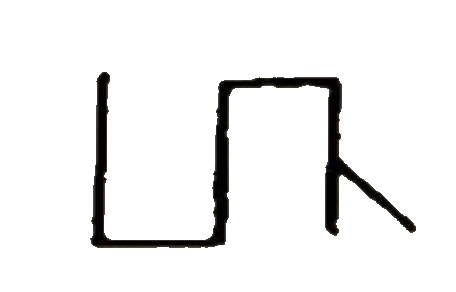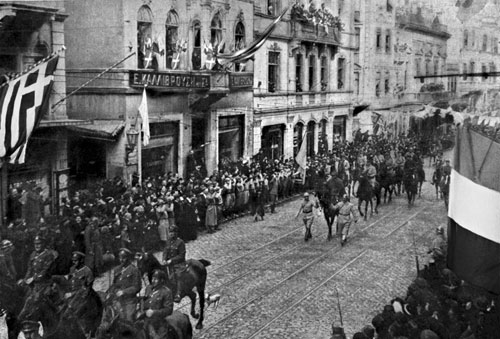|
ÄḞskilipli Mehmed AtÄḟf Hoca
Mehmed ÃtÄḟf Hoca () was a Turkish Islamist. He was born in the village of Toyhane, in the district of Bayat, Ãorum Province, in the Ottoman Empire (present-day Turkey) and went to school there. After a couple of years as an imam in ÄḞskilip (hence "ÄḞskilipli" meaning "from ÄḞskilip") in 1893 he went to Istanbul to continue his education, first at a medrese and from 1902 at DarÃỳ'l-fÃỳnun Faculty of Divinity. He graduated in 1903 and took a job teaching as Ders-i Amm (Ulama), at the madrasah in the Fatih Mosque, Istanbul. He was later arrested and jailed several times, but freed. He and Mustafa Sabri were the founding members of '' Cemiyet-i MÃỳderrisin.'' They were fiercely against the national government in Ankara which led the Turks to the Turkish War of Independence. His father was a Turk from the Akkoyunlu BayÄḟndÄḟr tribe, while his mother was an Arab originally from Hijaz. In 1924, before the westernization movement in Turkey, he wrote a book titled ''Frenk Mukalli ... [...More Info...] [...Related Items...] OR: [Wikipedia] [Google] [Baidu] [Amazon] |
Toyhane, Bayat
Toyhane is a village in the Bayat District of Ãorum Province Ãorum () is a province in the Black Sea Region of Turkey, but lying inland and having more characteristics of Central Anatolia than the Black Sea coast. Its area is 12,428 km2, and its population is 524,130 (2022). Its provincial capital ... in Turkey. Its population is 286 (2022). References Villages in Bayat District, Ãorum {{Ãorum-geo-stub ... [...More Info...] [...Related Items...] OR: [Wikipedia] [Google] [Baidu] [Amazon] |
Medrese
Madrasa (, also , ; Arabic: Ù ØŸØḟØġØ© , ), sometimes Romanization of Arabic, romanized as madrasah or madrassa, is the Arabic word for any Educational institution, type of educational institution, secular or religious (of any religion), whether for elementary education or higher learning. In countries outside the Arab world, the word usually refers to a specific type of religious school or college for the study of the religion of Islam (loosely equivalent to a Seminary, Christian seminary), though this may not be the only subject studied. In an Islamic architecture, architectural and historical context, the term generally refers to a particular kind of institution in the historic Muslim world which primarily taught Sharia, Islamic law and Fiqh, jurisprudence (''fiqh''), as well as other subjects on occasion. The origin of this type of institution is widely credited to Nizam al-Mulk, a vizier under the Seljuk Empire, Seljuks in the 11th century, who was responsible for buildi ... [...More Info...] [...Related Items...] OR: [Wikipedia] [Google] [Baidu] [Amazon] |
Muslims
Muslims () are people who adhere to Islam, a Monotheism, monotheistic religion belonging to the Abrahamic religions, Abrahamic tradition. They consider the Quran, the foundational religious text of Islam, to be the verbatim word of the God in Abrahamic religions, God of Abraham (or ''Allah'') as it was revealed to Muhammad, the last Islamic prophet. Alongside the Quran, Muslims also believe in previous Islamic holy books, revelations, such as the Tawrat (Torah), the Zabur (Psalms), and the Injeel (Gospel). These earlier revelations are associated with Judaism and Christianity, which are regarded by Muslims as earlier versions of Islam. The majority of Muslims also follow the teachings and practices attributed to Muhammad (''sunnah'') as recorded in traditional accounts (hadith). With an estimated population of almost 2 billion followers, Muslims comprise around 26% of the world's total population. In descending order, the percentage of people who identify as Muslims on each ... [...More Info...] [...Related Items...] OR: [Wikipedia] [Google] [Baidu] [Amazon] |
Infidels
An infidel (literally "unfaithful") is a person who is accused of disbelief in the central tenets of one's own religion, such as members of another religion, or irreligion, irreligious people. Infidel is an Ecclesiology, ecclesiastical term in Christianity around which the Church developed a body of theology that deals with the concept of infidelity, which makes a clear differentiation between those who were baptized and followed the teachings of the Church versus those who are outside the faith. Christians used the term ''infidel'' to describe those perceived as the enemies of Christianity. After the ancient world, the concept of otherness, an exclusionary notion of the outside by societies with more or less coherent cultural boundaries, became associated with the development of the monotheistic and prophetic religions of Judaism, Christianity, and Islam (cf. pagan). In modern literature, the term infidel includes in its scope Atheism, atheists, Polytheism, polytheists, Animism, ... [...More Info...] [...Related Items...] OR: [Wikipedia] [Google] [Baidu] [Amazon] |
Sharia Law
Sharia, SharÄḋ'ah, Shari'a, or Shariah () is a body of religious law that forms a part of the Islamic tradition based on scriptures of Islam, particularly the Qur'an and hadith. In Islamic terminology ''sharÄḋÊṡah'' refers to immutable, intangible divine law; contrary to ''fiqh'', which refers to its interpretations by Islamic scholars. Sharia, or fiqh as traditionally known, has always been used alongside customary law from the very beginning in Islamic history; has been elaborated and developed over the centuries by legal opinions issued by qualified jurists â reflecting the tendencies of different schools â and integrated and with various economic, penal and administrative laws issued by Muslim rulers; and implemented for centuries by judges in the courts until recent times, when secularism was widely adopted in Islamic societies. Traditional theory of Islamic jurisprudence recognizes four sources for Ahkam al-sharia: the Qur'an, '' sunnah'' (or authentic ... [...More Info...] [...Related Items...] OR: [Wikipedia] [Google] [Baidu] [Amazon] |
AtatÃỳrk's Reforms
AtatÃỳrk's reforms ( or ''AtatÃỳrk Devrimleri''), also referred to as the Turkish Revolution (Turkish language, Turkish: ''TÃỳrk Devrimi''), were a series of political, legal, religious, cultural, social, and economic policy changes, designed to transform the new Turkey, Republic of Turkey into a Secularism in Turkey, secular, modern Nation state, nation-state, implemented under the leadership of Mustafa Kemal AtatÃỳrk in accordance with the Kemalism, Kemalist framework. The principal political entity, the Republican People's Party (CHP), ruled One-party period of the Republic of Turkey, Turkey as a one-party state from 1923 to 1945, with several exceptions of attempts for a multi-party democracy. Death and state funeral of Mustafa Kemal AtatÃỳrk, Following AtatÃỳrk's death in 1938, his successor ÄḞsmet ÄḞnönÃỳ took over the leadership and integrated further Kemalist reforms. ÄḞnönÃỳ's work was however stranded by World War II and the CHP eventually 1950 Turkish general elect ... [...More Info...] [...Related Items...] OR: [Wikipedia] [Google] [Baidu] [Amazon] |
Hejaz
Hejaz is a Historical region, historical region of the Arabian Peninsula that includes the majority of the western region of Saudi Arabia, covering the cities of Mecca, Medina, Jeddah, Tabuk, Saudi Arabia, Tabuk, Yanbu, Taif and Al Bahah, Al-Bahah. It is thus known as the "Western Province",Mackey, p. 101. "The Western Province, or the Hejaz[...]" and it is bordered in the west by the Red Sea, in the north by Jordan, in the east by the Najd, and in the south by Greater Yemen, Yemen. Its largest city is Jeddah, which is the second-largest city in Saudi Arabia, with Mecca and Medina, respectively, being the third- and fourth-largest cities in the country. As the location of the Holy city, holy cities of Mecca and Medina, respectively the first and second holiest sites in Islam, the Hejaz is significant in the Arabo-Islamic historical and political landscape. This region is the most populated in Saudi Arabia, and Arabic is the predominant language, as in the rest of Saudi Arabia, ... [...More Info...] [...Related Items...] OR: [Wikipedia] [Google] [Baidu] [Amazon] |
Bayandur (tribe)
The Bayandur (, , ), also spelled Bayundur or Bayindir, is an Oghuz Turks, Oghuz Turkic tribe. Originally one of the 7 original tribes that made up the KimekâKipchak confederation, they later joined the Oghuz Turks. The Bayandur originated from Central Asia. History The Bayandur are known from Arab and Persian sources. The Bayandur was one of the 7 original tribes that made up the Kimek confederation, along with the Imur/Imi, Imak Tatars (Kimek), Tatar, Kipchaks, Kipchak, Lanikaz and Ajlad. The Kimek tribes originated in the Central Asian steppes, and had migrated to the territory of present-day Kazakhstan. The Bayandur, as part of the Kimek, were mentioned by Gardizi. The Bayandur left the Kimek and joined the Oghuz Turks, Oghuz. After disintegrating, half of the tribe united with the Kipchaks. While part of the Oghuz, they were mentioned by Kashgari. They were described in the Russian annals on 11th-century events while part of the Kipchaks. Aq Qoyunlu The Aq Qoyunlu was ... [...More Info...] [...Related Items...] OR: [Wikipedia] [Google] [Baidu] [Amazon] |
Turkish War Of Independence
, strength1 = May 1919: 35,000November 1920: 86,000Turkish General Staff, ''TÃỳrk ÄḞstiklal Harbinde BatÄḟ Cephesi'', Edition II, Part 2, Ankara 1999, p. 225August 1922: 271,000CelÃḃl Erikan, RÄḟdvan AkÄḟn: ''KurtuluÅ SavaÅÄḟ tarihi'', TÃỳrkiye ÄḞÅ̧ BankasÄḟ KÃỳltÃỳr YayÄḟnlarÄḟ, 2008, p. 339. , strength2 = 60,000 30,000 20,000 7,000 , casualties1 = 13,000 killedKate Fleet, Suraiya Faroqhi, ReÅat Kasaba: The Cambridge History of Turkey Volume 4'', Cambridge University Press, 2008, , p. 159.22,690 died of diseaseSabahattin Selek: ''Millî MÃỳcadele â Cilt I (engl.: National Struggle â Edition I)'', Burçak yayÄḟnevi, 1963, p. 109. 5,362 died of wounds or other non-combat causes35,000 wounded7,000 prisonersAhmet Ãzdemir''SavaÅ esirlerinin Milli mÃỳcadeledeki yeri'', Ankara University, TÃỳrk ÄḞnkÄḟlap Tarihi EnstitÃỳsÃỳ AtatÃỳrk Yolu Dergisi, Edition 2, Number 6, 1990, pp. 328â332Total: 83,052 casualties , casualties2 = 24,240 kill ... [...More Info...] [...Related Items...] OR: [Wikipedia] [Google] [Baidu] [Amazon] |
Government Of The Grand National Assembly
The Government of the Grand National Assembly (), self-identified as the State of Turkey () or Turkey (), commonly known as the Ankara Government (), or archaically the Angora Government, was the provisional and revolutionary Turkish government based in Ankara (then known as Angora) during the Turkish War of Independence (1919â1923) and during the final years of the Ottoman Empire. It was led by the Turkish National Movement, as opposed to the crumbling '' Constantinople Government/Istanbul Government'', which was led by the Ottoman Sultan. During the War of Independence, the Government of the Grand National Assembly commanded the army known as Kuva-yi Milliye ("National Forces"). After the war and victory over the monarchist Constantinople Government, the republican Ankara Government declared the end of the Ottoman Empire and the creation of the Republic of Turkey from its ashes in 1923. The Grand National Assembly is today the parliamentary body of Turkey. Background At th ... [...More Info...] [...Related Items...] OR: [Wikipedia] [Google] [Baidu] [Amazon] |
Cemiyet-i MÃỳderrisin
Cemiyet-i MÃỳderrisîn was an Islamist organization in Turkey led by ÄḞskilipli Mehmed AtÄḟf Hoca which aimed to increase religiosity in Turkish society. History The group was founded on February 15, 1919. Although the group did not permit their members to actively participate in politics, it did permit party membership. On September 1919, the group published a statement on ÄḞkdam Newspaper, heavily criticizing and insulting the KuvÃḃ-yi Milliye. Later, the group began to participate in politics and entered the general assembly in November 1919, and under the name TeÃḃlî-i ÄḞslÃḃm Cemiyeti. The group allied with Freedom and Accord Party and was headquartered in Istanbul, with intensive operations in and around Konya. On February 19, 1919, it was named TeÃḃlî-i ÄḞslÃḃm Cemiyeti, and when Mustafa Sabri Mustafa Sabri Effendi (; 1869 â 1954) was the second last Shaykh al-IslÄm of the Ottoman Empire. He is known for his opinions condemning the Turkish nationalist movement u ... [...More Info...] [...Related Items...] OR: [Wikipedia] [Google] [Baidu] [Amazon] |




